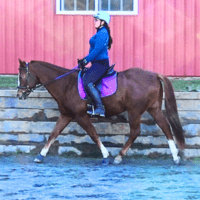Can horses eat celery, or can it harm my horse?
You might be wondering if celery is safe for horses to eat, if it makes a good horse treat, and if it is possible to feed them too much.
Learn more about whether it is safe to feed celery, the benefits of celery, how to be careful when feeding celery, if there are horses that should avoid it, and yummy celery recipes for your equine partner.
I will try to answer all your questions and concerns when it comes to using celery as a treat for your horse.
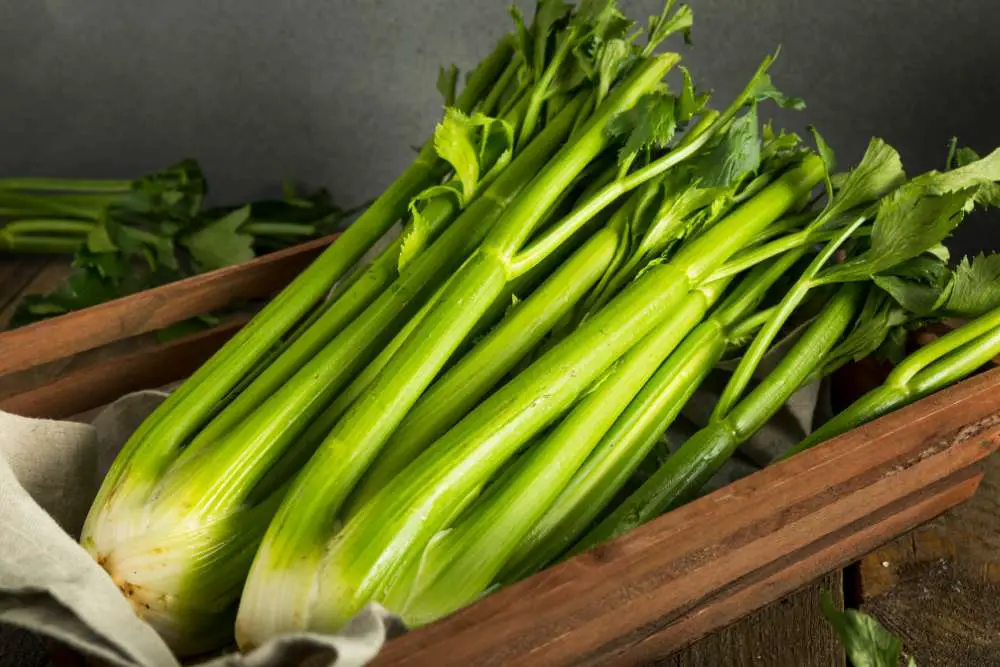
Is It Safe For Horses To Eat Celery?
Yes, it is safe to feed celery to your horse, and it is considered a healthy treat for horses.
Horses are herbivores and enjoy eating grass, hay, grain, and even fruits and vegetables. Though it’s important to note that not all fruits and vegetables are safe for horses.
It is important to make sure celery does not form the majority of a horse’s diet. There are problems with feeding treats in excess.
To be safe with celery, you want to make sure:
- It is an appropriate treat for your horse.
- That you prepare the vegetable properly
- That you are feeding an appropriate amount
Horses usually chew their food before they swallow it, but there are times when horses just swallow it without chewing. Especially with fruits and vegetables, this puts your horse at risk of choking.
So cutting the celery into small bite-sized pieces is one of the steps to preparing the vegetable and is important for your horse’s safety.
Can Horses Eat Celery Stalk?
Yes, horses can eat the celery stalk, but it is important to cut these up into pieces.
Can Horses Eat Celery Leaves?
Yes, horses can eat the celery leaves, like the celery stalk, but they should only be eaten in moderation.
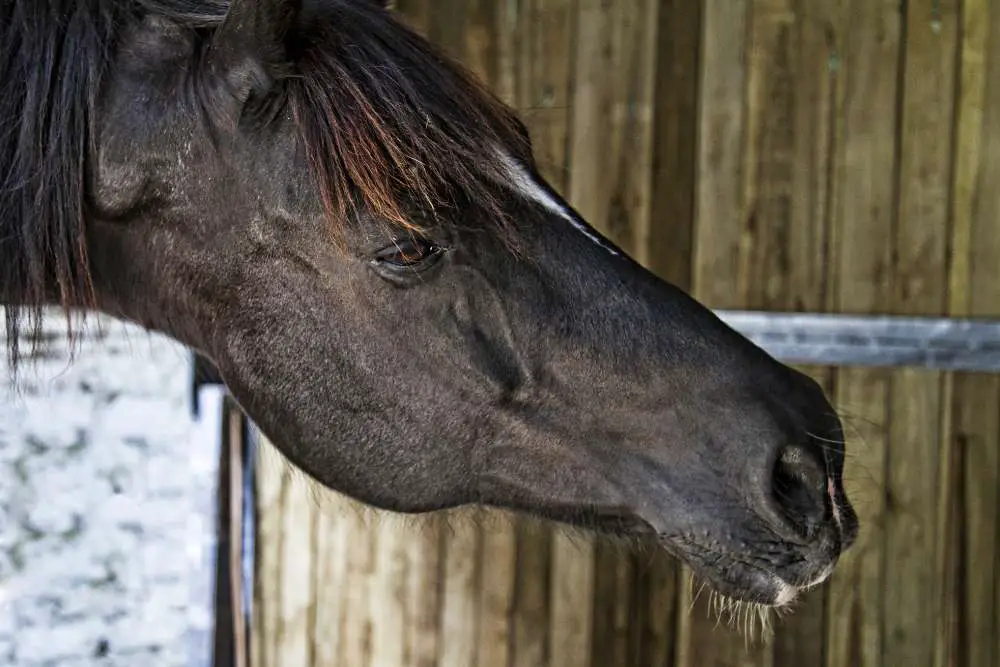
Risks Associated With Horses Eating Celery
Although celery is generally considered to be a safe and healthy food for horses, you may still wonder, “Could celery be harmful?”
Here are some risks associated with feeding celery to horses:
Choking
Choking is a risk if the horse doesn’t chew well or if they are fed whole stalks of celery.
The celery is very fibrous and tends to stick together and be stringy.
Because celery stalks are stringy, the horse could swallow part of one while the other remained in their mouth.
To be safe, cut the celery up into pieces or let the horse take a bite at a time. Don’t feed a whole stalk of celery at once.
Digestive Upset Or Even Colic
Due to the high fiber content, eating too much celery could lead to digestive upset, diarrhea, or even colic.
The horse’s digestive system has a delicate balance of bacteria and other microorganisms that help the gastrointestinal system work properly.
It’s quite simple to disturb the equilibrium in the horse’s digestive system, particularly if you feed foods that aren’t part of their normal diet. Too many treats of any type might set off a chain reaction that can escalate to colic or another illness.
This is the most important reason to limit treats.
To avoid this problem, feed your horse celery in moderation.
Allergic Reaction
If you feed celery that has gone bad, your horse may experience an allergic reaction. Rarely, a horse may be sensitive or allergic to fresh celery by itself.
The symptoms of food allergies vary widely among animals, including horses. Food allergies often cause a lot of itching, but hives that don’t itch can also happen.
Bad food reactions can also cause local swelling, sores from scratching, redness, scaly skin, and hair loss.
There may also be diarrhea and other problems with the gut.
Because the symptoms of a food allergy aren’t always clear, it’s important to rule out other skin conditions before a food allergy can be diagnosed.
Make sure that you feed your horse fresh celery and stay alert to any allergic reactions after your horse tries celery.
Potential Risk Of Parasites Or Microorganisms
Your celery may contain Parasites and microorganisms. The way it gets there can come from different sources.
The soil is a source, and animal manure that has not been in the sun for the proper amount of time and irrigated water can sometimes carry parasites and microorganisms. There are other ways this can happen as well.
The best thing to do is to wash your celery well before giving it to your horse.
Toxins From Pesticides
Celery, like other vegetables, often has pesticides used on them, which are toxic.
Here is a quote from the EWG (Environmental Working Group) website.
“Celery rarely carries the residue of just one pesticide. Government lab tests have found that 95 percent of celery samples tested positive for pesticides; and 85 percent of them contained several different chemicals. Overall, 67 different pesticides showed up on various celery samples. The samples averaged 3.79 different chemicals each. Some samples had as many as 13 chemicals.”
–EWG
Another reason to wash your celery before feeding it to your horse and consider feeding organic celery as opposed to non organic which should have less contaminants.
Is Any Part of Celery Toxic to Horses?
Celery is generally safe for horses to consume, both the leaves and the stalks, like I mentioned before.
However, there is the potential risk of parasites or microorganisms being present, which can cause harm to your horse.
Furthermore, celery may contain toxins from pesticides or when it goes bad, so it should be washed and inspected for signs of spoilage or contamination before being fed to horses.
It is important to ensure the celery is washed thoroughly before being fed to your horse to reduce the risk of any unwanted contaminants.
Can Celery Cause Side Effects On Horses
Yes, it’s possible for celery to cause side effects in horses.
These side effects will most likely happen due to:
- Not being washed.
- There is far too much being fed.
- Bad celery is being fed.
- Allergic reaction.
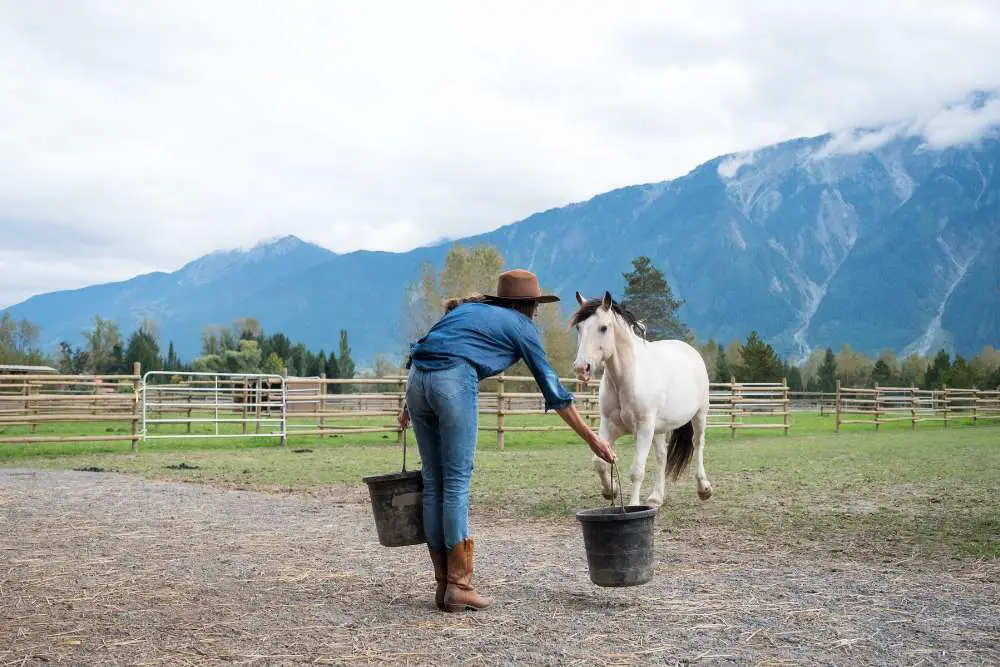
What Can Happen If A Horse Eats Too Much Celery?
In most cases, it isn’t likely that you will have life-threatening effects from your horse eating too much celery, but colic isn’t out of the question.
Celery doesn’t possess any inherent toxic qualities (unlike a vegetable like rhubarb).
But it can throw your horse’s digestive system out of whack and result in loose stools or diarrhea.
Then there is the potential that your horse could end up with colic, which is a more rare but possible situation.
How Much Is Too Much Celery For A Horse?
I have seen some articles saying not to feed more than 2 pounds at one time, but I think that is far too much.
It is not good to feed too much of any treat your horse is not used to, nor feed a high amount of treats every day; that is not part of the horse’s main diet plan.
Feeding your horse a pound of celery every day, which is roughly 450 grams, is probably going to cause issues for your horse.
It will also depend on your horse and how sensitive their digestive system is.
How Much Celery Is Okay For A Horse To Have?
If your horse is a celery fiend and you are worried about giving him too much, keep it to one stick of celery a day that is cut into appropriate bite-sized pieces.
However, I would feed no more than a cup or 101 grams of celery at one time and not every day.
It is not necessary, but personally, I like to mix up the types of treats my horses get when I am giving them treats on a regular basis.
So the horses will have variety, and they will not get too much of one kind of treat.
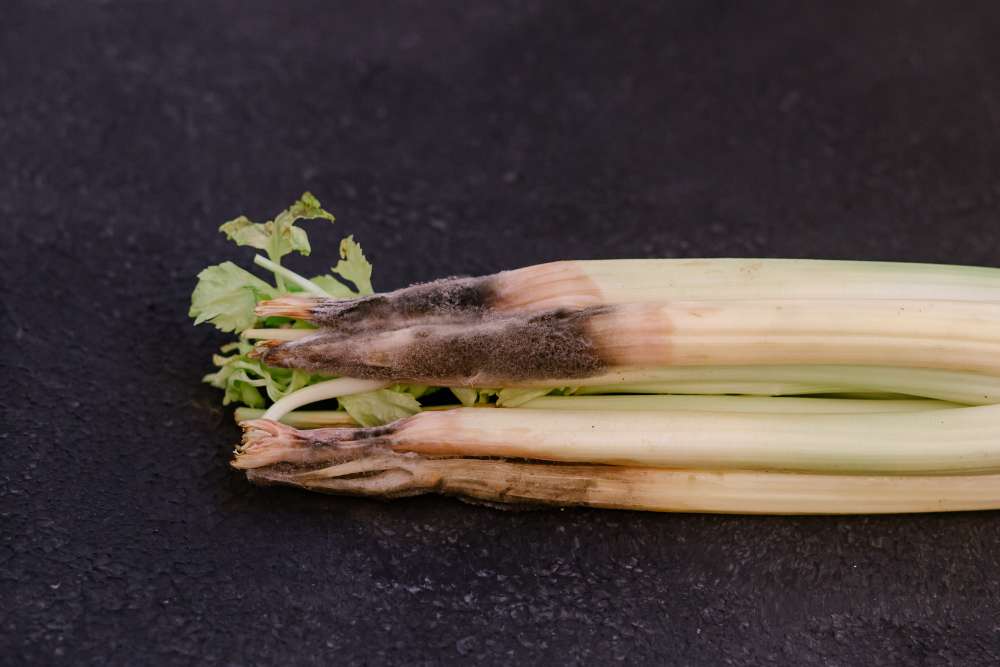
How To Know When Celery Is Bad
It is easy to spot when celery has gone bad or is past its expiration date.
Good celery stalks are usually vibrant and crunchy, but bad celery will have soft, limp, bendy stalks.
It will lose its bright color and become pale and faded. If the celery isn’t thrown away at this stage, it will then become moldy and slimy.
The smell is another good indicator that celery has gone bad. If you catch even a hint of a foul odor, throw that bunch out as it has likely started to go bad.
Is White Celery Bad?
It depends on whether it was white when you bought it. The celery most of us are used to is the standard green variety, but there is a type of celery that has thinner white stalks.
If you purchased this white celery at your grocery store and the stalks are still fibrous and crunchy, it is safe to feed to your horse.
If you bought green celery that has turned white, avoid feeding it.
What Happens If A Horse Eats Bad Celery?
Firstly, it is unlikely that a horse will eat bad or spoiled celery.
They have a good sense of smell that steers them away from eating poisonous foods and plants in the wild, which they have not lost despite being domesticated.
If your horse consumes bad celery, such as moldy celery, you should contact your veterinarian for advice.
Mold can cause digestive issues, which can include colic, but a small amount shouldn’t cause life-threatening issues.
Should Horses Eat Celery?
Horses love to eat this crunchy vegetable, along with other common vegetables such as corn, squash, sweet potatoes, and turnips.
Vegetables are also high in vitamins. Celery has a lot of vitamin K.
Celery is also low in sugar, unlike other treats such as apples, molasses, or sugar cubes, which are better to avoid.
That doesn’t mean you can’t feed your horse apples, as long as you keep them in moderation.
Are There Any Horses That Should Stay Away From Celery?
Most horses are fine with eating celery as a treat. If you are unsure, it is best to consult with your vet before feeding your horse celery.
The following are answers to questions people had about whether certain horses can eat celery or not.
Can Horses With Metabolic Issues Eat Celery?
Celery is an acceptable treat for horses with metabolic disorders such as insulin resistance.
These horses are often not allowed to eat apples or carrots due to their sugar content, but since celery contains a low sugar content, it could fit into their diet plan as a snack.
Can Horses With Laminitis Eat Celery?
Yes! If you have a horse with laminitis, you will know the struggle to keep their sugar diet low.
Celery fits the bill and provides them with good vitamins and minerals!
Can Horses With Gastric Ulcers Eat Celery?
Yes.
Horses with gastric ulcers need a low-concentrate and high-roughage diet, along with proper medication, to help with their ulcers.
It is now known that celery can be extremely beneficial for those who suffer from gastric ulcers, as it helps to increase the amount of gastric mucus, making it a good option even if they have ulcers.
Can Horses With HYPP Eat Celery?
Horses suffering from hyperkalemic periodic paralysis (HYPP) should stay away from celery and other treats high in potassium.
HYPP is a scary disease that makes horses weak, paralyzed, and even cause them to fall down.
Celery has a notable level of potassium, about 286 mg per portion, so it is not suitable for horses suffering from HYPP.
Their diet plays a big role in managing the condition, so adding any new treats or making diet changes must be done with a veterinarian’s approval.
Can Miniature Horses Eat Celery?
Absolutely. Just make sure to give them size-appropriate amounts.
Your 17hh thoroughbred should not be getting the same amount of snacks as your miniature horse!
Can Horses With Dental Problems Eat Celery?
Caution needs to be taken when giving treats to horses with dental issues.
There are multiple reasons for this.
The first is that chewing a crunchy snack like celery may cause the horse pain.
The second is that a horse that is battling to chew is more likely to try and swallow whatever treat you are giving them.
This can lead to their choking.

7 Benefits of Horses Eating Celery
Now that we have covered whether celery is safe for horses, horses that can eat celery, and horses that should avoid celery, as well as the risks associated with horses eating celery, let’s go over the good things about it.
Celery is a healthy food for humans and horses, packed with nutrients and vitamins.
The following are some key points about why it makes a good treat, so here are the seven benefits of feeding celery to your horse:
1) Excellent Nutritional Value
Celery is a very healthy vegetable that is full of important vitamins and minerals like vitamin A, vitamin K, vitamin C, potassium, and folate.
Here is a list of some of the nutrients found in celery:
- Calcium
- Copper
- Fiber
- Folate
- Iron
- Magnesium
- Pantothenic Acid
- Phosphorous
- Potassium
- Riboflavin
- Sodium
- Thiamine
- Vitamin A
- Vitamin B6
- Vitamin E
- Vitamin K
- Water
- Zinc
Because these nutrients are important for good health, celery is a great food to add to any diet.
2) High In Fiber
Horses need fiber in their diet in order to maintain a healthy digestive system. Fiber is one of the most important components, along with water, for keeping the digestive system functioning properly.
Celery is a great source of fiber because it has both soluble and insoluble fiber.
3) Rich In Antioxidants
Celery is a great source of antioxidants. Each stick of celery has at least 12 powerful antioxidant nutrients, including vitamin C, vitamin K, beta-carotene, and vitamin K.
These antioxidants help protect your cells from oxidative damage, promoting better health and wellness.
4) High Water Content
Fiber and water are important parts of a horse’s diet, so they should be the first things you think about when planning a horse’s diet.
A balanced diet with plenty of fresh forage, hay, and grains is necessary for a horse to stay healthy and thrive. Also, it’s important for a horse’s health to always have access to clean, fresh water.
Celery is made up of 95% water, making it an excellent source of hydration. This high water content helps to keep the digestive system functioning properly and can help flush out toxins from the body.
5) Low-Calorie Treat
Low-calorie treats are an important part of a horse’s diet, as they provide an enjoyable reward without adding excessive calories.
Low-calorie treats should be given in moderation, as too many can lead to weight gain and health issues.
Celery makes a great treat option for horses needing to watch their diet due to its low-calorie content. You can also use low-calorie treats to help horses keep a healthy weight and keep their minds active.
6) Anti-Inflammatory
Recent research suggests that celery may have anti-inflammatory effects on humans. This could be helpful for horses with long-term inflammation and diseases like arthritis, which are common in older horses.
In particular, the celery plant and its seeds have 25 anti-inflammatory compounds that could help reduce inflammation.
7) Low In Sugar
There is a low sugar content in celery, making this green vegetable a great choice for your horse, especially horses with metabolic issues.
Nutritional Value Of Celery
The nutrition facts for celery will vary depending on the amount of celery.
The nutrition facts below are based on one cup of chopped celery at 101 grams.
This information is from nutritionvalue.org. The link will bring you to the page for celery, where you can put in the amount of celery and it will give you the nutritional value for that amount, including the facts below as well as fatty acids, proteins, and more.
Nutrition Facts
| Portion Size | 101 g |
| Calories | 14 |
| Total Fat | 0.2g |
| Sodium | 81mg |
| Total Carbohydrate | 3g |
| Dietary Fiber | 1.6g |
| Sugar | 1.4g |
| Protein | 0.7g |
| Vitamin D | 0mcg |
| Calcium | 40mg |
| Iron | 0.2mg |
| Potassium | 263mg |
Vitamins In Celery
| Nutrient | Amount |
|---|---|
| Vitamin A, RAE | 22.22 mcg |
| Carotene, alpha | 0.00 mcg |
| Carotene, beta | 272.70 mcg |
| Cryptoxanthin, beta | 0.00 mcg |
| Lutein + zeaxanthin | 285.83 mcg |
| Lycopene | 0.00 mcg |
| Retinol | 0.00 mcg |
| Thiamin [Vitamin B1] | 0.021 mg |
| Riboflavin [Vitamin B2] | 0.058 mg |
| Niacin [Vitamin B3] | 0.323 mg |
| Pantothenic acid [Vitamin B5] | 0.248 mg |
| Vitamin B6 | 0.075 mg |
| Vitamin B12 [Cobalamin] | 0.00 mcg |
| Vitamin B12, added | 0.00 mcg |
| Folate, DFE [Vitamin B9] | 36.36 mcg |
| Folate, food | 36.36 mcg |
| Folic acid | 0.00 mcg |
| Vitamin C [Ascorbic acid] | 3.1 mg |
| Vitamin D | 0.00 mcg |
| Vitamin E (alpha-tocopherol) | 0.27 mg |
| Vitamin E, added | 0.00 mg |
| Tocopherol, alpha | 0.27 mg |
| Tocopherol, beta | 0.00 mg |
| Tocopherol, delta | 0.00 mg |
| Tocopherol, gamma | 0.00 mg |
| Tocotrienol, alpha | 0.01 mg |
| Tocotrienol, beta | 0.00 mg |
| Tocotrienol, delta | 0.00 mg |
| Tocotrienol, gamma | 0.00 mg |
| Vitamin K | 29.6 mcg |
| Vitamin K1 [Phylloquinone] | 29.6 mcg |
| Dihydrophylloquinone | 0.0 mcg |
| Betaine | 0.1 mg |
| Choline | 6.2 mg |
Minerals In Celery
| Nutrient | Amount |
|---|---|
| Calcium | 40.40 mg |
| Copper | 0.04 mg |
| Fluoride | 4.0 mcg |
| Iron | 0.20 mg |
| Magnesium | 11.11 mg |
| Manganese | 0.104 mg |
| Phosphorus | 24.24 mg |
| Potassium | 262.60 mg |
| Selenium | 0.40 mcg |
| Sodium | 80.80 mg |
| Zinc | 0.13 mg |
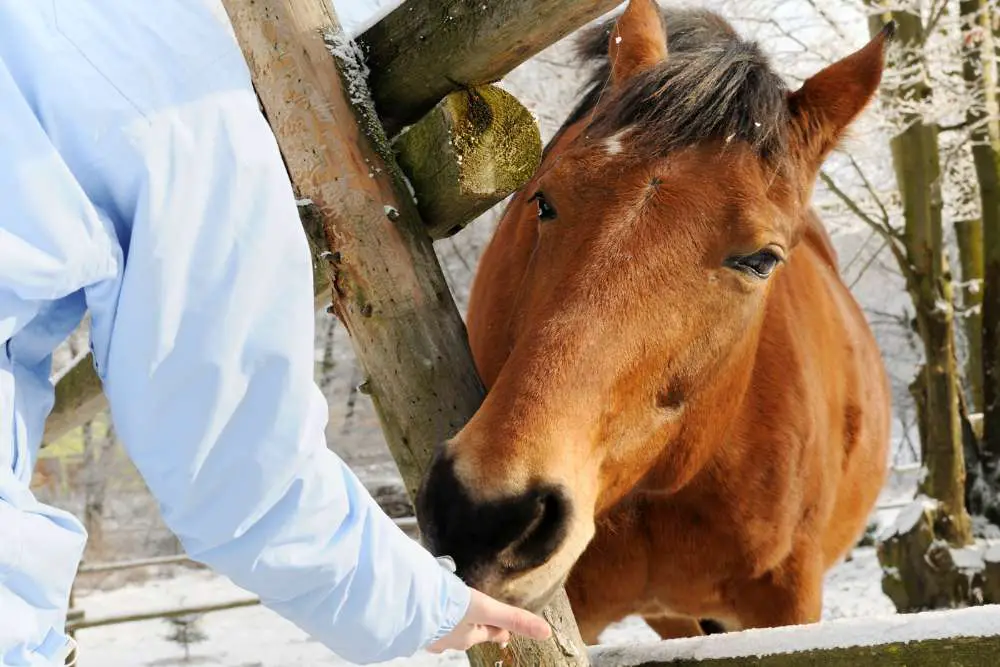
Do Horses Eat Celery If Offered?
This depends on your horse, as they all have different taste preferences.
Some horses are naturally more fussy than others, while some are real gluttons that will scoff down anything!
Most horses find celery an acceptable treat.
If you are curious whether a horse will eat celery, give it a go! You may have found their new favorite snack.
How Can You Get A Picky Horse To Eat Celery?
Getting a picky horse to eat anything is difficult, and with something that has a unique flavor like celery, it may be impossible.
You can try the celery recipes towards the bottom of the article.
Although, if your horse is fussy, stick with things like carrots and apples, although many horses enjoy celery.
However, you could also try giving them chunks of watermelon; maybe that will tickle their fancy!
How To Prepare Celery As A Horse Treat
So now you have a bunch of celery handy to treat your horse, but how do you give it to them? Here are things to keep in mind when feeding celery to your horse.
Choose Fresh Organic Celery
Make certain to use FRESH ORGANIC celery.The stalks must be crisp and bright, with no foul odor. With organic, you have less risk of contaminants.
Wash Before Feeding
Make sure you wash the celery. Celery can hold dirt, parasites, and microbes in its crevices and may have been sprayed with pesticide.
Horses and dirt are not a good combination, as it tends to not pass through their system well and instead collect in their gut.
Rip off your celery stick, clean it under some water to remove any dirt, contaminates, or bugs.
Cut Into Small Pieces
Now, cut it into small pieces. You don’t want to feed your horse a long stick of celery or a bunch at once, as this will increase the risk of choking.
Offer your horse only a few pieces of celery at a time.
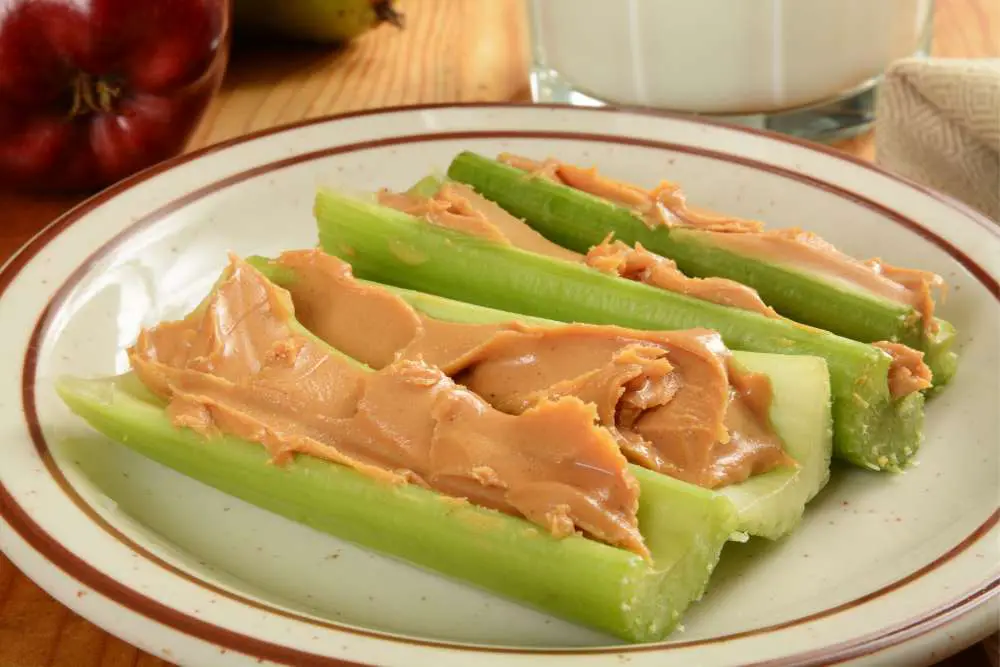
Can Horses Have Peanut Butter With Celery?
This may surprise you, but horses can actually eat peanut butter.
The combination of celery and peanut butter is fairly common for us people, but did you know that your horse can try it too?
You can bet your horse will love peanut butter and celery as much as you do, if not more.
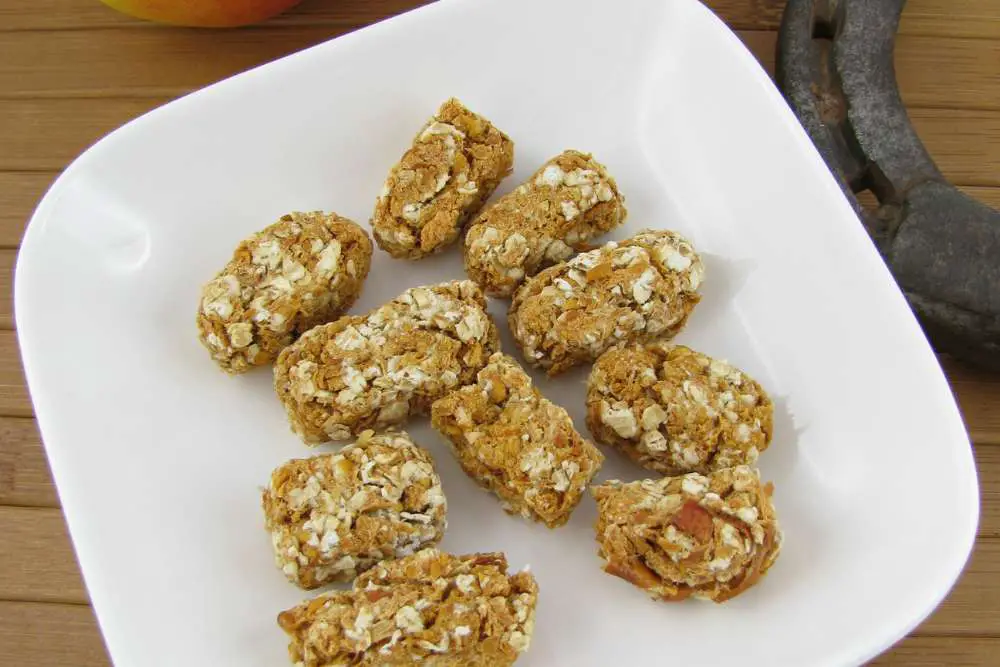
Yummy Celery Recipes
Here are some yummy recipes you can create with celery that your horse will thank you for. These recipes are not exact and are basic guidelines, you can swap out ingredients if needed.
If your horse is on a low-sugar diet, be wary of sugar-containing ingredients.
Hanging Donut Celery Popsicle
Yummy treat for a hot summer day.
What you will need:
- Doughnut mold (Amazon link)
- Baling twine or rope (to hang the donut popsicle)
- Celery and vegetables of choice (should be thoroughly washed.)
- Watered-down apple juice
- Freezer
- Cutting board
- Knife
Instructions:
- Chop up the celery and other vegetables.
- Layer celery and vegetables in the donut molds.
- Fill up the donut molds with diluted apple juice.
- Freeze overnight.
- Bring a donut popsicle to the barn.
- Tie up in the horse’s paddock or stall for a frozen treat, using rope or bailing twine.
Baked Celery Horse Treats
Simple baked celery horse treat.
What you will need:
- 3 cups oats
- 1/2 cup flour
- 2 large carrots, chopped or grated
- 1 cup of diced celery
- 1/4 cup honey
- 1 cup applesauce
- 1 tbsp vegetable oil or coconut oil
Instructions:
- Preheat your oven to 350 F.
- Grease a cookie sheet or line the sheet with parchment paper instead.
- Finely chop or grate 2 large carrots into small pieces, and dice 1 cup of celery. A food processor works great for this if you have one.
- Combine the oats and flour together in a large bowl until they are well mixed.
- Stir in the applesauce and honey. Mix well.
- Roll the mix into small balls.
- Place the uncooked treats on a baking sheet that has been greased or lined.
- Allow to cool after baking for 15 minutes at 350°F.
- Let your horses enjoy these as an occasional treat!
Celery And Peanut Butter Treat
I mentioned before that horses can have peanut butter.
What you will need:
- 1 celery stick
- 1 tbsp peanut butter
Instructions:
- Cut up the celery on a cutting board into four or five pieces.
- Divide the peanut butter among the pieces.
- See how much your horse loves this simple, tasty, crunchy treat.
Horse Celery Soup
Great for a cold winter treat. This should be a replacement for one of your horse’s grain meals and is great for getting more water into your horse.
What you will need:
- regular grain meal
- 1/4 cup molasses
- 2 chopped stalks of celery
- 2 chopped carrots
- hot water
Instructions:
- In the feed bucket, put grain.
- Add hot water slowly and stir until enough hot water is added to reach the desired consistency.
- Stir the molasses into the mixture.
- Add chopped carrots and celery into the mixture.
- Let the soup cool before feeding it to your horse.
- Do not feed this more than a couple times per month as a treat.
- Let your horse enjoy it!
What Are Some Vegetables Horses Should Horses Avoid Eating?
There are many safe fruits and vegetables for you to treat your horses with. There are also snacks that should be absolutely avoided. Here are five vegetables your horse should avoid.
1) Tomatoes
Okay, so tomatoes are technically a fruit, but most of us think of them as vegetables, so I had to include them on the list. Tomatoes can cause constipation and increase heart rates in horses.
2) Potatoes
Potatoes aren’t inherently bad for horses, as some people may have seen when sneaking their show pony a few french fries at shows. They can cause problems if they are unripe, as potatoes that are too green can give your horse toxicosis. Potatoes can also be a choking risk.
3) Rhubarb
Rhubarb is something to completely avoid as a snack. It contains calcium oxalates, and this is not something horses tolerate well. Horses that have consumed rhubarb can suffer damage to their urinary tracts and digestive systems. This can lead to kidney failure.
4) Onions and Garlic
Onions and garlic are members of the allium family of plants. As with dogs, you should avoid giving these to horses, as they can damage red blood cells.
5) Broccoli
Broccoli is another vegetable that should not be fed to horses. Broccoli contains a type of sugar (raffinose) that can cause intestinal gas. While this may be a funny side effect for humans, it spells serious problems for horses and can lead to gas colic.
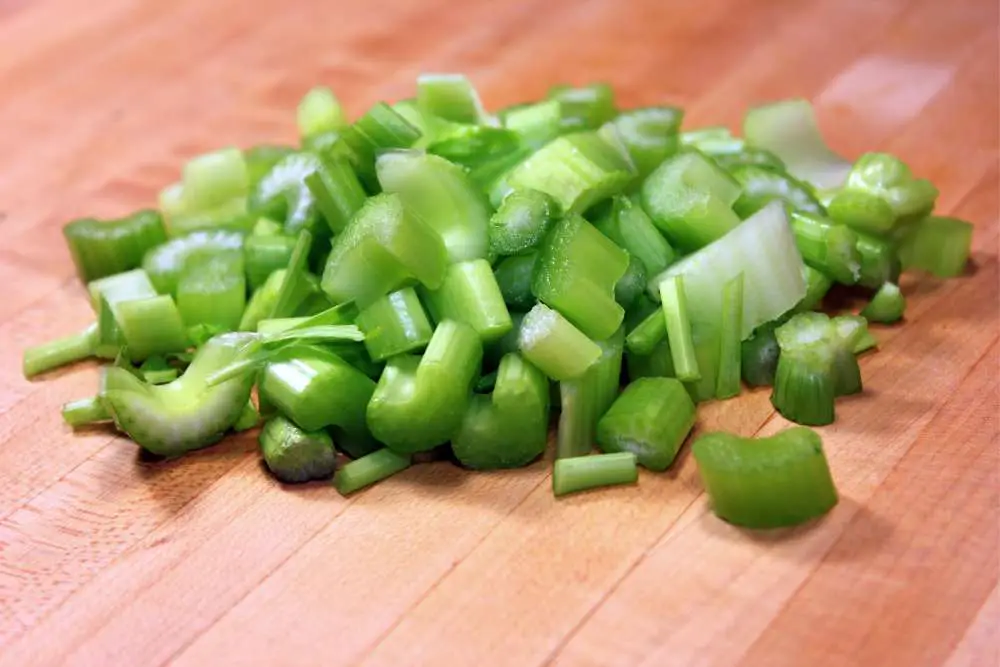
Conclusion About Feeding Celery To Horses
Can horses eat celery? Now you know yes they can and it is healthy for most horses. Here is a summary of the important points in the article.
- Celery is generally safe for horses to eat as long as you feed it to them in moderation, prepare the celery properly, and make sure it is fresh.
- Like other vegetables and fruits, it can provide some important vitamins and minerals, but it should not be the main source of nutrition for a horse.
- Horses should not be given large amounts of celery at once, as it can cause digestive upset.
- Certain horses should not have celery, such as horses with HYPP or horses with dental problems.
- There are some tasty celery recipes you can try with your horse, but be cautious of ingredients with high sugar content if your horse is on a low sugar diet.
Cheers, Kacey

